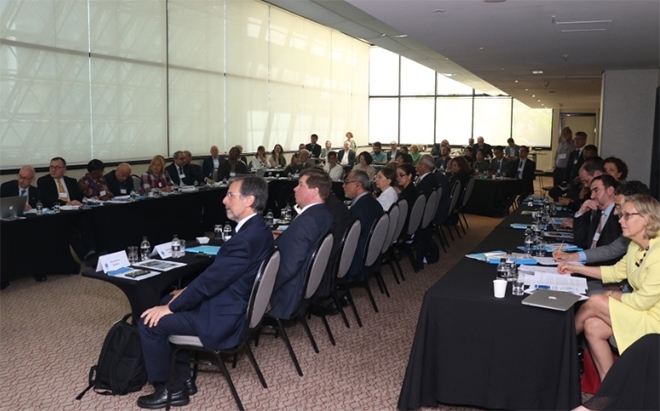

Representatives of several initiatives that support the movement for open access and seek to revolutionize the academic publishing system meet in São Paulo and announce a statement of principles (photo: Felipe Maeda / Agência FAPESP)
Representatives of several initiatives that support the movement for open access and seek to revolutionize the academic publishing system meet in São Paulo and announce a statement of principles.
Representatives of several initiatives that support the movement for open access and seek to revolutionize the academic publishing system meet in São Paulo and announce a statement of principles.

Representatives of several initiatives that support the movement for open access and seek to revolutionize the academic publishing system meet in São Paulo and announce a statement of principles (photo: Felipe Maeda / Agência FAPESP)
By Karina Toledo | Agência FAPESP – Eighty per cent of the scientific articles published worldwide are locked behind paywalls used by the big publishers to monetize the contents of their journals. However, the movement to universalize free open access to scientific knowledge has become stronger in recent years. A number of initiatives involving different approaches have been launched.
Representatives of five important initiatives that aim to revolutionize academic publishing met in São Paulo, Brazil, on May 1, 2019, to exchange experiences and align strategies. The workshop took place in parallel with the 8th Annual Meeting of the Global Research Council (GRC), which comprises the heads of the world’s foremost research funding agencies.
“We all share the same principles. We see scientific knowledge as a common good, since it’s funded with public money. Access to this content should therefore be a right,” said Marc Schiltz, President of Science Europe, an association of European research funding and research performing organizations.
The group’s common objective, according to Schiltz, is to achieve universal open access to academic publications on an immediate basis, i.e. without embargo periods. Another principle advocated by the group is that articles should be published under an open licence so that others can reuse them without incurring royalties. “The GRC’s annual meeting is an excellent opportunity to meet funders from several countries and promote our agenda,” Schiltz said.
Opening the workshop on behalf of FAPESP, Scientific Director Carlos Henrique de Brito Cruz recalled that the Foundation has taken pains to promote open science since at least 1997, when it launched the Scientific Electronic Library Online (SciELO). “I won’t be so bold as to say we invented the concept of open access, but we’ve been part of this movement since its inception,” Brito Cruz said.
SciELO was represented at the event by Abel Packer, its director and co-founder. “We’re an online library comprising a selection of scientific journals in all knowledge areas,” Packer said. “Most of the collection is funded by the national science, technology and innovation system. We publish about 15,000 articles per year, and we have a digital repository with 800,000 articles. Our main interest is assuring the visibility of these publications. We have a system to measure citations and downloads.”
Another initiative presented to the meeting was Plan S, backed by an international consortium of research funders called cOAlition S. Science Europe is one of the prime movers. The group advocates that by 2020 all scientific publications resulting from research funded by public grants must be published in open access journals or platforms. This means the journals currently considered gold standard will cease to be the first option for researchers unless the main publishers adapt to the new times.
Plan S was represented at the event by David Sweeney, Executive Chair of Research England. “We research funders can’t solve the issue of open science on our own, but we’re a key element and should work together, shouldering the responsibility that comes with our role in the academic system. This question can’t be tackled without considering the implications for research evaluation,” he said.
Colleen Campbell presented the Open Access 2020 Initiative, which she coordinates at Max Planck Digital Library. This group’s main strategy is to promote transformative agreements whereby the resources currently spent on journal subscriptions can be repurposed to support sustainable open access (OA) business models. The same sources that currently subsidize paid access to journals will instead fund OA publication.
Arianna Becerril, Executive Director of the Latin America, Caribbean, Spain and Portugal Scientific Journal Network (REDALYC), an online library similar to SciELO, spoke about AmeliCA, an initiative to promote open knowledge for Latin America and the Global South.
Molapo Qhobela, CEO of South Africa’s National Research Foundation (NRF), described the African Open Science Platform.
At the end of the workshop, Schiltz announced that the five initiatives had jointly drafted a statement of principles to offer guidelines to members of the OA movement and align their strategies. The document will shortly be available from Science Europe.
“We’re living at a time when the possibility of turning the academic publishing system toward OA is within reach,” Schiltz said. “The current system is becoming unsustainable. A huge amount of public money is being absorbed to pay for journal subscriptions, and published research results are also funded by public money. These movements are a sign that the scientific community is ready and willing to take back control of the publishing system.”
More information about the 8th Annual Meeting of the Global Research Council: www.fapesp.br/eventos/grc.
Republish
The Agency FAPESP licenses news via Creative Commons (CC-BY-NC-ND) so that they can be republished free of charge and in a simple way by other digital or printed vehicles. Agência FAPESP must be credited as the source of the content being republished and the name of the reporter (if any) must be attributed. Using the HMTL button below allows compliance with these rules, detailed in Digital Republishing Policy FAPESP.





